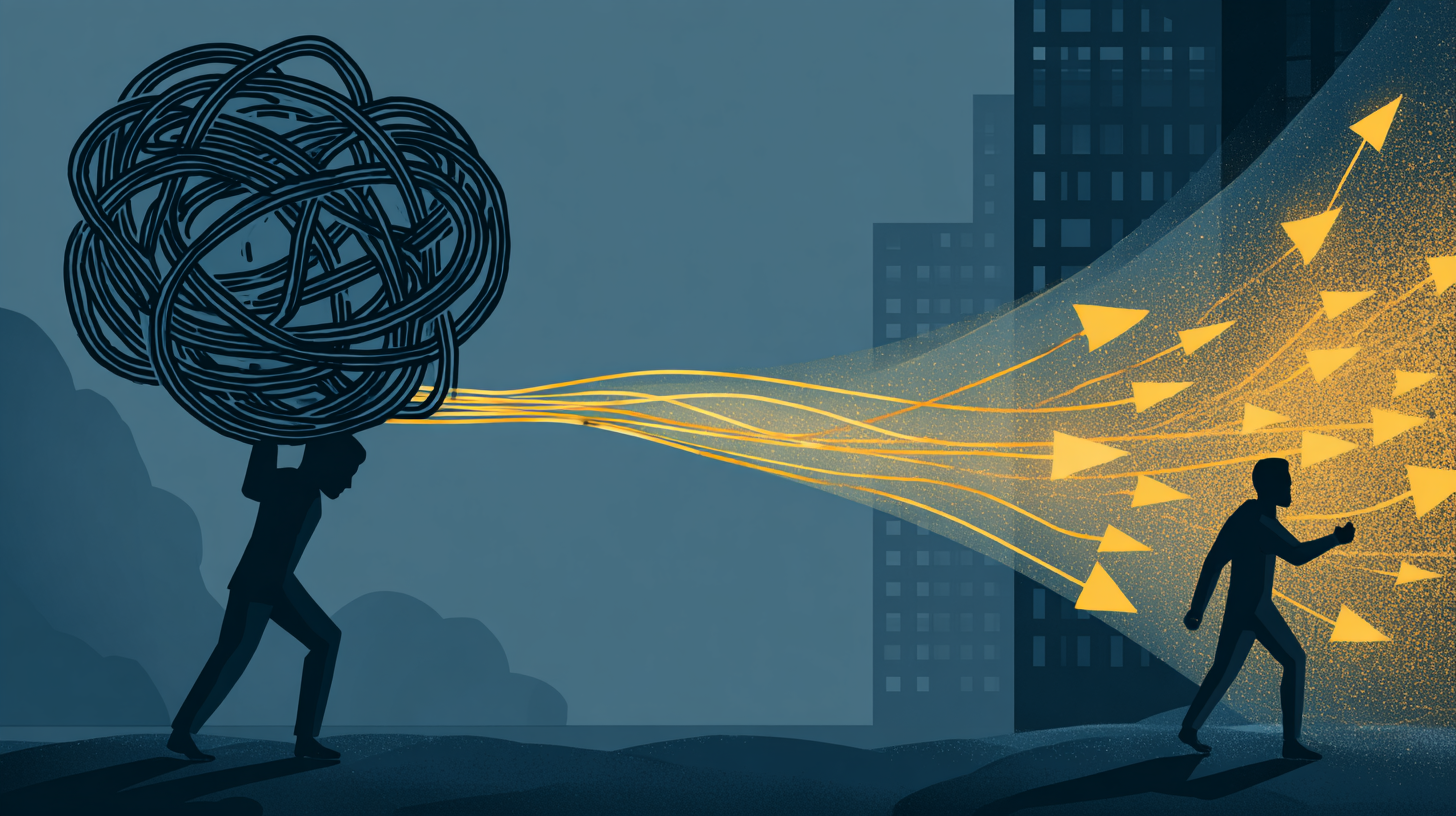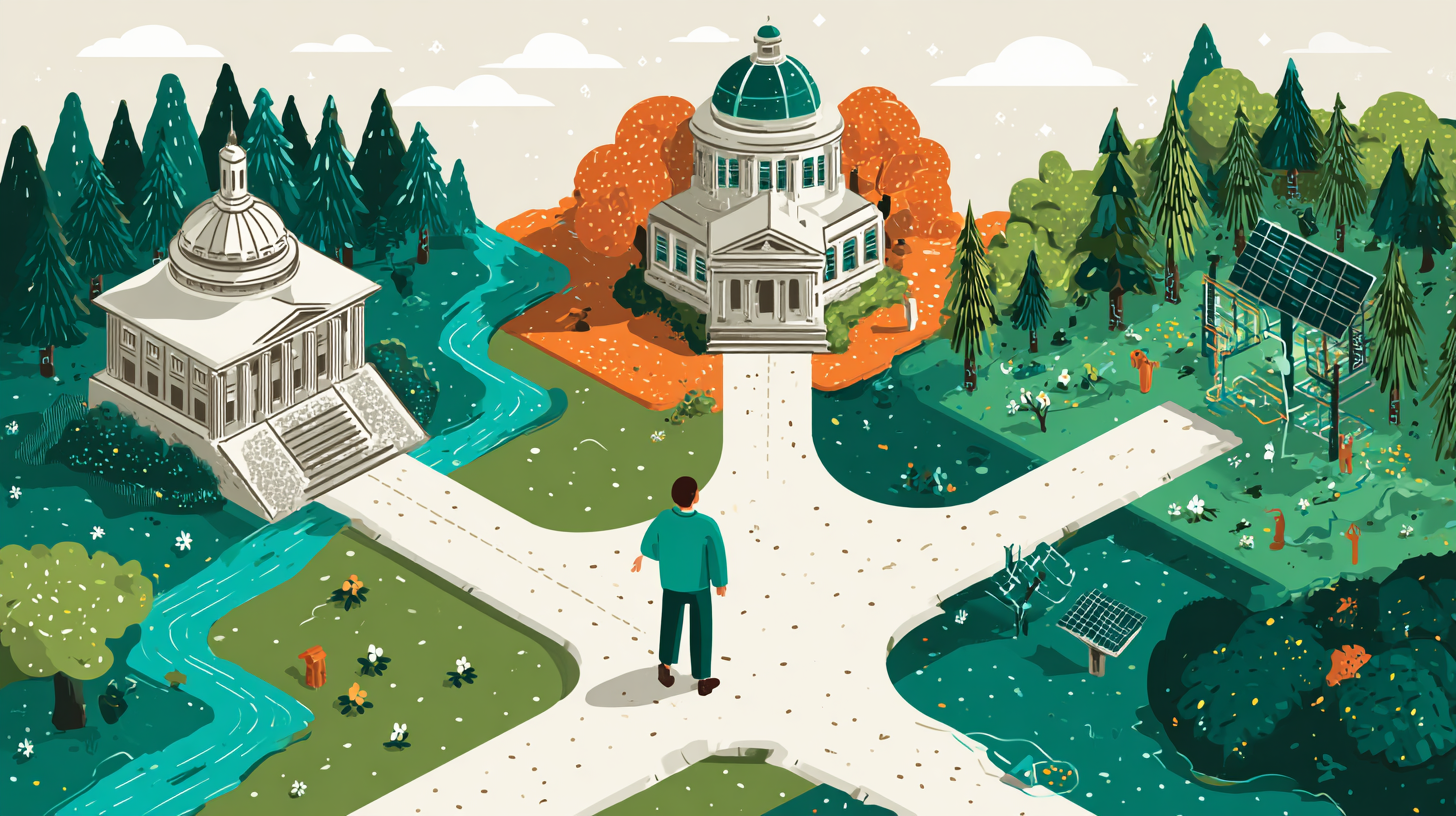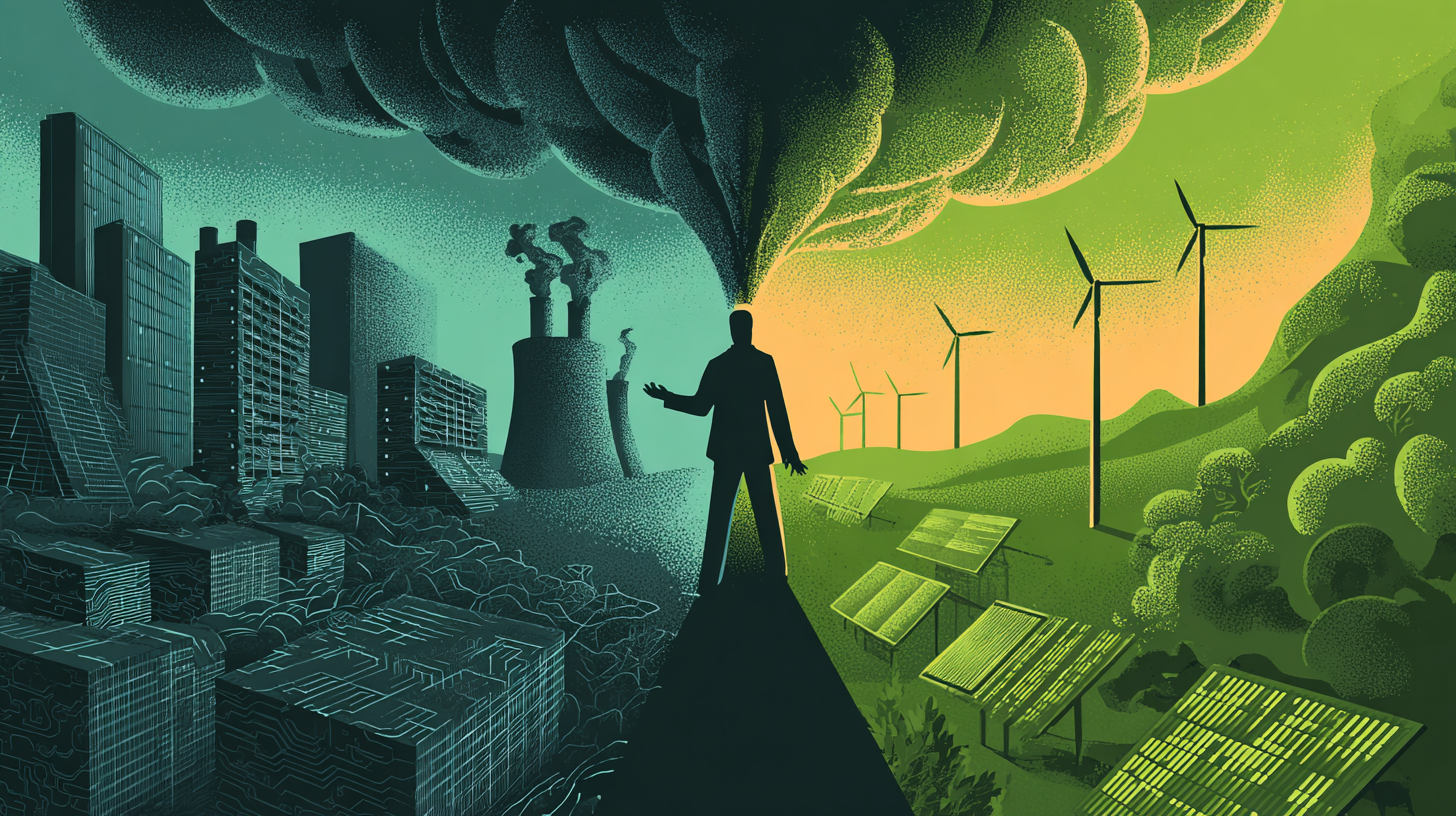Should you feel guilty about using ChatGPT? The truth about AI's environmental impact
A Forest for a Paper Towel: The One-Prompt Paradox
I met a student recently who told me she limits herself to one ChatGPT prompt a day. One. Why? Because she felt so profoundly guilty about AI's environmental footprint that she'd essentially put herself on digital rations.
Her story hit me hard. It's a feeling many of us grapple with, isn't it? This quiet, personal rationing, like trying to save a forest by using one less paper towel, while the logging industry clear-cuts acres. The guilt is real, absolutely. It proves that you care, and to me that's amazingly powerful.
Here’s where lenses and perspective matters. . . While your concern is valid, the focus of that guilt might be misplaced. And understanding why that matters is crucial for real progress.
This is the central paradox of our moment: the same technology sparking our environmental anxiety holds within it the very potential to help solve our greatest climate challenges. But we can't harness that potential if the people who care most—people like you—are stepping back instead of stepping up. And yes… those were strategically placed em dashes! 😮

Beyond Your Prompt: Where the Real Environmental Power Lies
Let’s get REAL about the numbers first. AI does have an environmental footprint, and the figures can be jarring. Training a massive model like GPT-3 generated an estimated 502 tons of CO2—that's roughly equivalent to 112 cars driving for an entire year straight. Each ChatGPT query can indeed consume significantly more energy than a typical Google search. Data centers are projected to use 8% of U.S. electricity by 2030, with AI being a primary driver of this surge.
On that note, there’s a CRITICAL NUANCE that often gets lost in the headlines: these numbers primarily reflect the infrastructure and development decisions of large corporations, not your individual daily query.
Let that sink in.
Think about it this way—that massive 502-ton carbon footprint from training GPT-3? That's a one-time cost borne by the developer during the model's creation, not something that happens every time you ask ChatGPT to help you write an email. Your single prompt, or even a hundred prompts, isn't the primary driver of these colossal figures.
The real environmental impact comes from the massive, energy-intensive training runs, the constant cooling of server farms housing thousands of GPUs, and most importantly, the energy sources powering those data centers.
Whether a data center runs on coal or solar power makes infinitely more difference than how many prompts you send today.
The System Problem: Why 72% of Companies Are Flying Blind
This is where we shift our lens from individual guilt to systemic responsibility. The environmental impact of AI isn't primarily about YOUR usage habits—it's about the foundational infrastructure decisions made by tech giants, energy companies, and policymakers.
Here's something that should astonish you: a recent study found that 72% of businesses using AI haven't even begun to measure its environmental impact. This isn't a secret; it's a systemic oversight. The problem isn't the energy being used; it's the energy BEING IGNORED.
Meanwhile, the companies that are measuring and acting are making infrastructure investments that dwarf any individual conservation effort. Microsoft just committed $10 billion to Brookfield Asset Management to bring 10.5 gigawatts of renewable energy online—that's more than three times the power used by the world's largest data center hub. Google procured over 8 GW of clean energy in 2024 alone, contributing to a 12% reduction in data center emissions despite a 27% increase in electricity use.
The real responsibility lies squarely with corporations, policymakers, and energy providers to build a sustainable AI future. Understanding this distinction is liberating because it moves us from passive guilt to active, impactful advocacy.
From Fault to Fuel: Why Your Care Is Our Greatest Asset
Let's be clear about something: if you're feeling this guilt, it means you care deeply about our planet. That makes you EXACTLY the kind of person we need in this conversation. Your empathy isn't a burden; it's a powerful force.
The paradox is that while your concern is valid, self-limitation like that student rationing her prompts isn't the solution.
It's a personal sacrifice that doesn't address the root cause.
In fact, that guilt, left unexamined, becomes a trap. It diverts our energy toward small, isolating acts and away from the collective advocacy that forces systemic change. It makes us shy away from the very tools that could help us innovate our way out of this crisis. When environmentally conscious people like you step back from AI, we lose your values, your critical thinking, and your creativity precisely when we need them most.
Look, I get it. There's something satisfying about personal sacrifice—it feels like doing something. But imagine if every environmentally conscious person limited themselves to one Google search per day because the internet uses energy.
We'd lose the ability to research climate solutions, organize environmental movements, or spread awareness about sustainability. The same logic applies to AI.

The AI Climate Paradox: When the Problem Becomes the Solution
Here's where things get truly fascinating, and WHY WE NEED PEOPLE LIKE YOU engaged, not retreating. The very technology causing some environmental concern also holds immense potential to solve our most pressing climate challenges.
Google has already used AI to reduce energy consumption in their own data centers by 15%—that's real energy savings happening right now. AI is optimizing energy grids across the globe, dynamically balancing supply and demand to reduce waste and integrate renewables more efficiently. It's enabling advanced climate modeling that allows scientists to predict environmental changes with unprecedented accuracy.
Think about AI-driven resource management systems that minimize waste and optimize supply chains. Consider sustainable agriculture applications where AI helps farmers use less water and pesticides while maintaining crop yields. There are intelligent waste reduction systems that sort and recycle more effectively than any human-operated system could.
But here's what really gets me excited: Amazon's new data center designs, launching in 2025, are projected to reduce mechanical energy consumption by 46% during peak cooling conditions. They're using concrete with 35% lower embodied carbon and renewable diesel that cuts greenhouse gas emissions by up to 90% compared to conventional fuel. These innovations exist because AI's growth created the demand and funding for sustainable infrastructure solutions.
This is why we absolutely need environmentally conscious people like you to engage with AI, not shy away from it. We need your values guiding this technology's development and application. We need you asking the hard questions, demanding transparency, and using these tools to amplify environmental solutions.
It's Your Duty to Help, Not Your Fault to Blame
Here, we must draw a critical distinction—one that my mentor shared with me years ago that profoundly shifted my perspective. There's a world of difference between fault for a problem and responsibility to help solve it.
You are not to blame for the current energy infrastructure or the historical development of AI. The decisions about whether data centers run on coal or renewables, whether companies measure their environmental impact, whether energy grids prioritize fossil fuels—those aren't your fault. That responsibility lies with corporations, policymakers, and energy providers who control the levers of systemic change.
But here's the empowering part: because you care, because you understand the stakes, you do have a responsibility—a duty, really—to channel that concern into meaningful action. This isn't about carrying guilt; it's about wielding influence.
So let's release that misplaced guilt. And in its place, let's pick up something far more powerful: a sense of duty. Your concern isn't a reason to retreat; it's a mandate to engage more thoughtfully, more strategically, and more effectively.
This means using AI responsibly, yes, but more importantly, it means actively pushing for the systemic changes that will truly green the technology. It's about demanding better infrastructure, not just limiting your own usage.
Beyond Limiting Prompts: Your Real Power Playbook

So what does responsible engagement actually look like? How do you channel environmental concern into systemic action? Here's your real power playbook:
Advocate for Green Infrastructure Ask the companies whose AI tools you use about their energy sources. When you're evaluating which AI platforms to use for work or personal projects, factor in their environmental commitments. Support policies that incentivize renewable energy for data centers. Use your voice on social media, in community discussions, or by contacting your representatives to demand greener tech infrastructure.
Microsoft's recent commitment to restart the Three Mile Island nuclear facility to power AI operations happened partly because customers and stakeholders demanded cleaner energy sources. Your voice matters.
Support Companies Walking the Walk Look for companies that are transparent about their environmental impact and actively investing in sustainable AI development. Amazon achieved 100% renewable energy matching across their global operations in 2023, seven years ahead of schedule. Google's new demand response programs allow their data centers to reduce power during high-stress grid periods, helping integrate more renewables. Vote with your wallet and attention for companies leading on sustainability.
Leverage AI for Environmental Good Don't just consume AI; create with it for environmental impact. Use AI tools for research into climate solutions, data analysis of environmental trends, or content creation to spread awareness about sustainability. Help organize advocacy campaigns, map deforestation patterns, optimize recycling routes, or design more efficient renewable energy systems.
The student I mentioned at the beginning? After our conversation, she started using AI to research and write compelling content about local environmental issues, reaching hundreds of people in her community. That's infinitely more impactful than rationing prompts.
Become the Person Who Shifts the Conversation This might be the most important action of all. When you hear a friend express their own AI guilt, guide them from personal anxiety to collective, systemic action. Share this perspective. Help shift the narrative from individual blame to systemic responsibility.
The more people who understand that the path forward isn't personal restriction but strategic engagement, the stronger our collective voice becomes for real change.
Stay Informed and Demand Transparency As AI continues evolving rapidly, stay curious about new developments in sustainable AI. Push for transparency from AI companies about their environmental impact. Support research into "green AI"—systems designed to be environmentally conscious from inception.
When companies announce new environmental commitments, hold them accountable. When they fall short, call them out. When they succeed, amplify their efforts to encourage industry-wide adoption of best practices.
The Future We're Building Together
Look, I won't sugarcoat this—AI's environmental impact is real and significant. Data center energy consumption could nearly double by 2030, and AI is a major driver of that growth. But the solution isn't for environmentally conscious people to retreat from this technology. The solution is for people like you to engage more strategically.
We're at a critical juncture. The next few years will determine whether AI becomes an environmental liability or one of our most powerful tools for climate solutions. That outcome depends on who's in the room shaping its development and deployment.
Every time someone who cares about the environment steps back from AI out of guilt, we lose a voice for sustainability in this space. Every time someone like you engages thoughtfully and advocates for better practices, we gain momentum toward a truly sustainable AI future.
Your care is a superpower. Don't let misplaced guilt diminish it. Instead, channel that energy into becoming a powerful advocate for systemic change that actually moves the needle.
The student limiting herself to one prompt per day? She cared deeply, and that was beautiful. But imagine if that same care was directed toward pressuring her university to source renewable energy, advocating for green tech policies, or using AI to solve environmental challenges on her campus.
That's the future we're building together—one where environmental consciousness drives engagement, not retreat. Where your duty to help creates more impact than your guilt ever could.
Because here's what a mentor of mine said to me once, 2 decades ago when I was burning with youthful rage… it’s something I want to leave you with: It's your duty to help with difficult things in the world. And sometimes with the big ones, it's not your fault.
Your concern proves you're exactly who we need in this conversation. So let's put that concern to work where it can truly make a difference.
Want to dig deeper into how you can channel environmental consciousness into systemic AI advocacy? I'd love to continue this conversation. Book a 30-minute digital coffee with me and let's explore how you can turn your care into real climate action.

